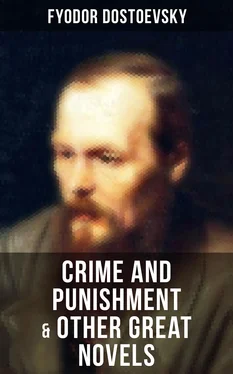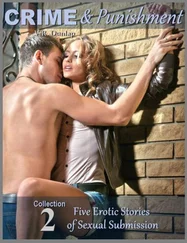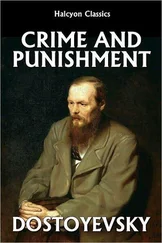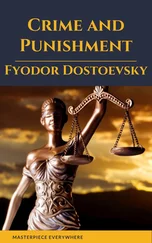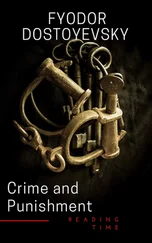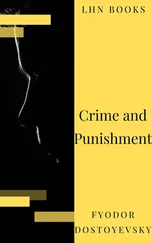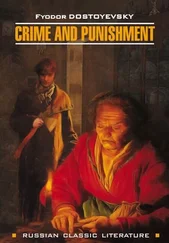“What would have become of me but for you?” she said quickly, meeting him in the middle of the room.
Evidently she was in haste to say this to him. It was what she had been waiting for.
Raskolnikov went to the table and sat down on the chair from which she had only just risen. She stood facing him, two steps away, just as she had done the day before.
“Well, Sonia?” he said, and felt that his voice was trembling, “it was all due to ‘your social position and the habits associated with it.’ Did you understand that just now?”
Her face showed her distress.
“Only don’t talk to me as you did yesterday,” she interrupted him. “Please don’t begin it. There is misery enough without that.”
She made haste to smile, afraid that he might not like the reproach.
“I was silly to come away from there. What is happening there now? I wanted to go back directly, but I kept thinking that . . . you would come.”
He told her that Amalia Ivanovna was turning them out of their lodging and that Katerina Ivanovna had run off somewhere “to seek justice.”
“My God!” cried Sonia, “let’s go at once . . . .”
And she snatched up her cape.
“It’s everlastingly the same thing!” said Raskolnikov, irritably. “You’ve no thought except for them! Stay a little with me.”
“But . . . Katerina Ivanovna?”
“You won’t lose Katerina Ivanovna, you may be sure, she’ll come to you herself since she has run out,” he added peevishly. “If she doesn’t find you here, you’ll be blamed for it . . . .”
Sonia sat down in painful suspense. Raskolnikov was silent, gazing at the floor and deliberating.
“This time Luzhin did not want to prosecute you,” he began, not looking at Sonia, “but if he had wanted to, if it had suited his plans, he would have sent you to prison if it had not been for Lebeziatnikov and me. Ah?”
“Yes,” she assented in a faint voice. “Yes,” she repeated, preoccupied and distressed.
“But I might easily not have been there. And it was quite an accident Lebeziatnikov’s turning up.”
Sonia was silent.
“And if you’d gone to prison, what then? Do you remember what I said yesterday?”
Again she did not answer. He waited.
“I thought you would cry out again ‘don’t speak of it, leave off.’” Raskolnikov gave a laugh, but rather a forced one. “What, silence again?” he asked a minute later. “We must talk about something, you know. It would be interesting for me to know how you would decide a certain ‘problem’ as Lebeziatnikov would say.” (He was beginning to lose the thread.) “No, really, I am serious. Imagine, Sonia, that you had known all Luzhin’s intentions beforehand. Known, that is, for a fact, that they would be the ruin of Katerina Ivanovna and the children and yourself thrown in — since you don’t count yourself for anything — Polenka too . . . for she’ll go the same way. Well, if suddenly it all depended on your decision whether he or they should go on living, that is whether Luzhin should go on living and doing wicked things, or Katerina Ivanovna should die? How would you decide which of them was to die? I ask you?”
Sonia looked uneasily at him. There was something peculiar in this hesitating question, which seemed approaching something in a roundabout way.
“I felt that you were going to ask some question like that,” she said, looking inquisitively at him.
“I dare say you did. But how is it to be answered?”
“Why do you ask about what could not happen?” said Sonia reluctantly.
“Then it would be better for Luzhin to go on living and doing wicked things? You haven’t dared to decide even that!”
“But I can’t know the Divine Providence. . . . And why do you ask what can’t be answered? What’s the use of such foolish questions? How could it happen that it should depend on my decision — who has made me a judge to decide who is to live and who is not to live?”
“Oh, if the Divine Providence is to be mixed up in it, there is no doing anything,” Raskolnikov grumbled morosely.
“You’d better say straight out what you want!” Sonia cried in distress. “You are leading up to something again. . . . Can you have come simply to torture me?”
She could not control herself and began crying bitterly. He looked at her in gloomy misery. Five minutes passed.
“Of course you’re right, Sonia,” he said softly at last. He was suddenly changed. His tone of assumed arrogance and helpless defiance was gone. Even his voice was suddenly weak. “I told you yesterday that I was not coming to ask forgiveness and almost the first thing I’ve said is to ask forgiveness. . . . I said that about Luzhin and Providence for my own sake. I was asking forgiveness, Sonia . . . .”
He tried to smile, but there was something helpless and incomplete in his pale smile. He bowed his head and hid his face in his hands.
And suddenly a strange, surprising sensation of a sort of bitter hatred for Sonia passed through his heart. As it were wondering and frightened of this sensation, he raised his head and looked intently at her; but he met her uneasy and painfully anxious eyes fixed on him; there was love in them; his hatred vanished like a phantom. It was not the real feeling; he had taken the one feeling for the other. It only meant that that minute had come.
He hid his face in his hands again and bowed his head. Suddenly he turned pale, got up from his chair, looked at Sonia, and without uttering a word sat down mechanically on her bed.
His sensations that moment were terribly like the moment when he had stood over the old woman with the axe in his hand and felt that “he must not lose another minute.”
“What’s the matter?” asked Sonia, dreadfully frightened.
He could not utter a word. This was not at all, not at all the way he had intended to “tell” and he did not understand what was happening to him now. She went up to him, softly, sat down on the bed beside him and waited, not taking her eyes off him. Her heart throbbed and sank. It was unendurable; he turned his deadly pale face to her. His lips worked, helplessly struggling to utter something. A pang of terror passed through Sonia’s heart.
“What’s the matter?” she repeated, drawing a little away from him.
“Nothing, Sonia, don’t be frightened. . . . It’s nonsense. It really is nonsense, if you think of it,” he muttered, like a man in delirium. “Why have I come to torture you?” he added suddenly, looking at her. “Why, really? I keep asking myself that question, Sonia . . . .”
He had perhaps been asking himself that question a quarter of an hour before, but now he spoke helplessly, hardly knowing what he said and feeling a continual tremor all over.
“Oh, how you are suffering!” she muttered in distress, looking intently at him.
“It’s all nonsense. . . . Listen, Sonia.” He suddenly smiled, a pale helpless smile for two seconds. “You remember what I meant to tell you yesterday?”
Sonia waited uneasily.
Читать дальше
